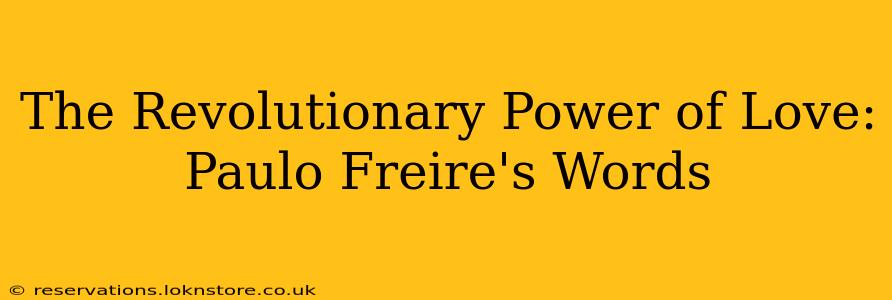Paulo Freire, the renowned Brazilian educator and philosopher, didn't just champion literacy; he championed liberation. His pedagogy, deeply rooted in critical consciousness, saw education not as a passive transfer of information but as a powerful tool for social transformation. While often associated with educational theory, Freire's work resonates powerfully with the transformative potential of love – a love that is active, critical, and fundamentally intertwined with justice. This isn't a sentimental, romantic love; it's a love demanding profound societal change. It's a love born from empathy, understanding, and a commitment to the liberation of the oppressed.
How Did Freire View Education?
Freire's approach to education radically challenged traditional, banking models of teaching. He argued against the "banking concept" where knowledge is deposited into passive students, instead advocating for "dialogical education." This approach emphasizes dialogue, critical reflection, and the active participation of learners in constructing their own understanding of the world. This active participation, fueled by a love for the potential of every individual, is key to Freire's revolutionary vision. He saw the teacher not as a dispenser of facts, but as a facilitator of critical consciousness – a guide helping students analyze their realities and work towards emancipation.
What Role Does Love Play in Freire's Pedagogy?
Love, for Freire, wasn't a mere addendum to his educational philosophy; it was foundational. It wasn't a passive emotion but an active commitment to the well-being and liberation of others. This love manifested in several ways:
- Humility: A willingness to learn from students, acknowledging their experiences and perspectives as valuable sources of knowledge. This humility stems from recognizing the inherent dignity of each individual.
- Empathy: The capacity to understand and share the feelings of others, particularly the oppressed. This deep understanding fuels a commitment to social justice and transformative action.
- Hope: A belief in the possibility of a more just and equitable world, even amidst seemingly insurmountable challenges. This hope sustains the revolutionary work of education and empowers both the teacher and the learner.
- Commitment to Dialogue: A genuine desire to engage in respectful, open-ended conversations with students, fostering critical reflection and collaborative learning. This commitment to dialogue demonstrates a respect for the inherent worth of each individual.
What is Critical Consciousness According to Freire?
Freire's concept of critical consciousness is central to understanding the role of love in his work. Critical consciousness is the ability to critically examine one's own reality, understand its social and political dimensions, and work towards transformative change. It's about recognizing the power structures that perpetuate inequality and actively challenging them. This process, nurtured by a loving and supportive educational environment, empowers individuals to become agents of their own liberation and the liberation of others. It's a love in action, actively striving for justice and equality.
How Does Freire's Work Connect to Social Justice?
Freire's work is deeply intertwined with social justice. He saw education as a crucial tool for combating oppression and promoting social transformation. His pedagogy is explicitly designed to empower marginalized communities to challenge unjust systems and create a more equitable world. This commitment to social justice is a direct reflection of his deep-seated love for humanity and a belief in the inherent dignity of all people. It's a love that demands action, not just sentiment.
What is the Significance of Freire's Legacy?
Freire's legacy continues to inspire educators, activists, and social justice advocates around the world. His ideas remain strikingly relevant in today's complex and often unequal societies. His emphasis on critical consciousness, dialogical education, and the transformative power of love offers a powerful framework for creating more just and equitable communities. His work reminds us that education isn't simply about acquiring knowledge; it's about empowering individuals to transform their lives and the world around them—a transformation fueled by a revolutionary love for humanity.
This exploration of Paulo Freire's philosophy reveals the profound connection between education, love, and social justice. His vision isn't just an educational theory; it's a call to action, a testament to the transformative power of a love that is both critical and profoundly committed to the liberation of all people. It’s a revolutionary love indeed.

